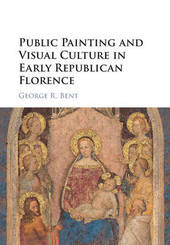
|
Public Painting and Visual Culture in Early Republican Florence
Hardback
Main Details
| Title |
Public Painting and Visual Culture in Early Republican Florence
|
| Authors and Contributors |
By (author) George Bent
|
| Physical Properties |
| Format:Hardback | | Pages:352 | | Dimensions(mm): Height 262,Width 185 |
|
| Category/Genre | Byzantine and medieval art c 500 CE to c 1400
Painting and paintings
Exhibition catalogues and specific collections |
|---|
| ISBN/Barcode |
9781107139763
|
| Classifications | Dewey:759.55109023 |
|---|
| Audience | | Professional & Vocational | | Tertiary Education (US: College) | |
|---|
| Illustrations |
34 Plates, color; 34 Halftones, color; 112 Halftones, black and white
|
|
Publishing Details |
| Publisher |
Cambridge University Press
|
| Imprint |
Cambridge University Press
|
| Publication Date |
16 January 2017 |
| Publication Country |
United Kingdom
|
Description
Street corners, guild halls, government offices, and confraternity centers contained paintings that made the city of Florence a visual jewel at precisely the time of its emergence as an international cultural leader. This book considers the paintings that were made specifically for consideration by lay viewers, as well as the way they could have been interpreted by audiences who approached them with specific perspectives. Their belief in the power of images, their understanding of the persuasiveness of pictures, and their acceptance of the utterly vital role that art could play as a propagator of civic, corporate, and individual identity made lay viewers keenly aware of the paintings in their midst. Those pictures affirmed the piety of the people for whom they were made in an age of social and political upheaval, as the city experimented with an imperfect form of republicanism that often failed to adhere to its declared aspirations.
Author Biography
George R. Bent is the Sydney Gause Childress Professor of the Arts at Washington and Lee University, Virginia, where he has taught in the Department of Art and Art History since 1993. A Fulbright scholar, Bent has written about the art of Lorenzo Monaco, Florentine art of the Late Middle Ages and Early Renaissance, and manuscript production in the fourteenth century.
Reviews'We learn, here, not only of works of art, but of the people of the Florentine Republic - of condemned criminals, prostitutes, merchants, government officials, guild members from the Arte della Lana and the Arte dei Giudici e Notai, laudesi, plague victims, the bishop and his entourage, the families of the newly baptized, and the would-be tyrant - and of how these and others lived lives shaped by images in an urban environment before the era of art.' Jonathan Kline, Renaissance Quarterly
|